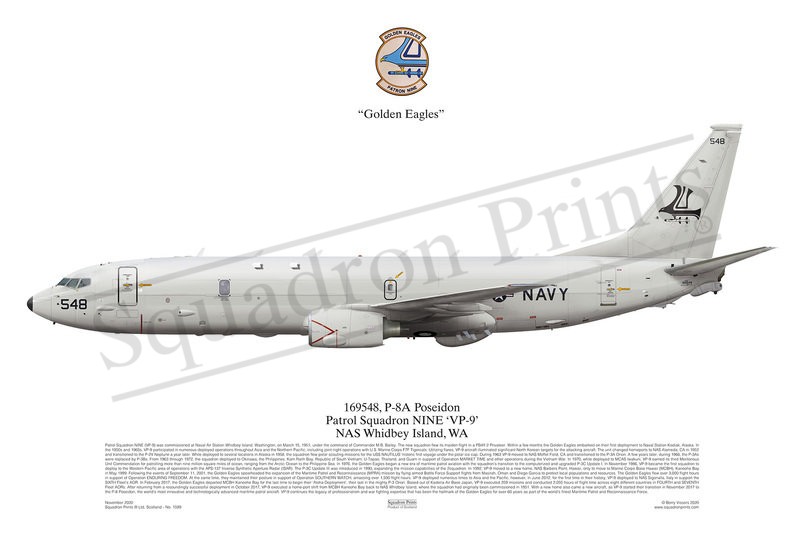#1599 P-8A Poseidon Squadron Print

Description
Squadron Prints Lithograph No. 1599 - 169548, P-8A Poseidon, Patrol Squadron NINE 'VP-9', NAS Whidbey Island, WA.
Patrol Squadron NINE (VP-9) was commissioned at Naval Air Station Whidbey Island, Washington, on March 15, 1951, under the command of Commander M.B. Bailey. The new squadron flew its maiden flight in a PB4Y-2 Privateer. Within a few months the Golden Eagles embarked on their first deployment to Naval Station Kodiak, Alaska. In the 1950s and 1960s, VP-9 participated in numerous deployed operations throughout Asia and the Northern Pacific, including joint night operations with U.S. Marine Corps F7F Tigercats. Utilizing flares, VP-9 aircraft illuminated significant North Korean targets for the attacking aircraft. The unit changed homeports to NAS Alameda, CA in 1952 and transitioned to the P-2V Neptune a year later. While deployed to several locations in Alaska in 1958, the squadron flew polar scouting missions for the USS NAUTILUS’ historic first voyage under the polar ice cap. During 1963 VP-9 moved to NAS Moffet Field, CA and transitioned to the P-3A Orion. A few years later, during 1966, the P-3As were replaced by P-3Bs. From 1963 through 1972, the squadron deployed to Okinawa; the Philippines; Kam Ranh Bay, Republic of South Vietnam; U-Tapao, Thailand, and Guam in support of Operation MARKET TIME and other operations during the Vietnam War. In 1970, while deployed to MCAS Iwakuni, VP-9 earned its third Meritorious Unit Commendation for patrolling more than nine million square miles of ocean, ranging from the Arctic Ocean to the Philippine Sea. In 1976, the Golden Eagles began a new era of maritime patrol aviation with the squadron’s transition to the computerized and upgraded P-3C Update I. In November 1986, VP-9 became the first squadron to deploy to the Western Pacific area of operations with the APS-137 Inverse Synthetic Aperture Radar (ISAR). The P-3C Update III was introduced in 1990, expanding the mission capabilities of the 2squadron. In 1992, VP-9 moved to a new home, NAS Barbers Point, Hawaii, only to move to Marine Corps Base Hawaii (MCBH), Kaneohe Bay in May 1999. Following the events of September 11, 2001, the Golden Eagles spearheaded the expansion of the Maritime Patrol and Reconnaissance (MPRA) mission by flying armed Battle Force Support flights from Masirah, Oman and Diego Garcia to protect local populations and resources. The Golden Eagles flew over 3,000 flight hours in support of Operation ENDURING FREEDOM. At the same time, they maintained their posture in support of Operation SOUTHERN WATCH, amassing over 1,500 flight hours. VP-9 deployed numerous times to Asia and the Pacific, however, in June 2012, for the first time in their history, VP-9 deployed to NAS Sigonalla, Italy in support the SIXTH Fleet’s AOR. In February 2017, the Golden Eagles departed MCBH Kaneohe Bay for the last time to begin their ‘Aloha Deployment’, their last in the mighty P-3 Orion. Based out of Kadena Air Base Japan, VP-9 executed 259 missions and conducted 2,055 hours of flight time across eight different countries in FOURTH and SEVENTH Fleet AORs. After returning from a resoundingly successful deployment in October 2017, VP-9 executed a home-port shift from MCBH Kaneohe Bay back to NAS Whidbey Island, where the squadron had originally been commissioned in 1951. With a new home also came a new aircraft, as VP-9 started their transition in November 2017 to the P-8 Poseidon, the world’s most innovative and technologically advanced maritime patrol aircraft. VP-9 continues the legacy of professionalism and war fighting expertise that has been the hallmark of the Golden Eagles for over 60 years as part of the world’s finest Maritime Patrol and Reconnaissance Force.
